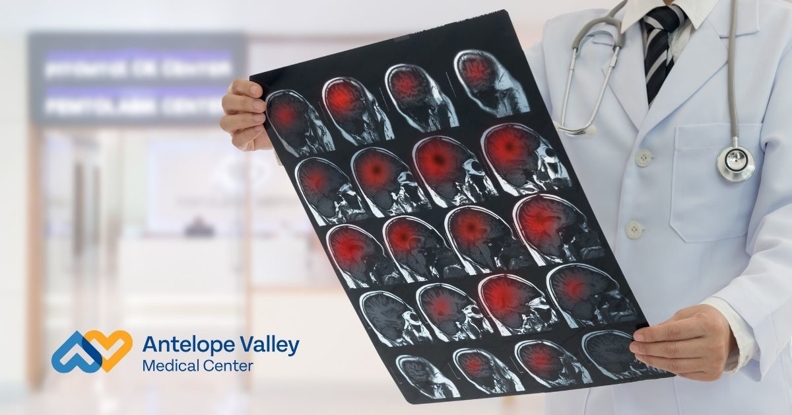Pancreatic Cancer Awareness Month: Symptoms, Treatment, and More
- Category: Blog, Cancer Care
- Posted On:
- Written By: Antelope Valley Medical Center

Understanding Pancreatic Cancer
Recognizing Early Symptoms: From Subtle Signs to Red Flags
Pancreatic cancer is notoriously challenging to detect early partly due to its subtle initial symptoms. These can often mimic less severe ailments, leading one to dismiss them. Early signs such as jaundice, an unexplained loss of weight, and abdominal pain may appear innocuous but should serve as critical red flags. Jaundice, characterized by the yellowing of the skin and eyes, is often one of the first recognizable symptoms and occurs when the jaundice spreads to other parts of the body. The resultant bile buildup can lead to itchiness and pale stools. Abdominal pain often begins as discomfort and gradually intensifies, sometimes radiating to the back. These symptoms emerge due to the tumor pressing against surrounding organs and nerves. Understanding these early symptoms is crucial, given that pancreatic cancer is often diagnosed in later stages due to its understated nature and late presentation. The challenge lies in differentiating these signs from everyday illnesses, underscoring the importance of heightened awareness and prompt medical consultation.
Unique Symptom Manifestations: Differentiating Between Types of Pancreatic Cancer
Pancreatic cancer is not a monolithic disease; it encompasses various types, predominantly exocrine and endocrine tumors, each presenting distinct symptomatology. Exocrine tumors, which make up approximately 95% of pancreatic cancer cases, interfere with digestive enzymes, leading to digestive problems such as steatorrhea, characterized by foul-smelling stools due to fat malabsorption. Additionally, they may cause changes in stool consistency and color. In contrast, endocrine tumors affect hormone levels, affecting the body's glucose balance and resulting in symptoms like hypoglycemia or hyperglycemia, dizziness, or confusion. Moreover, these rare tumors may secrete hormones like gastrin, leading to ulcers and other gastrointestinal issues. Recognizing the variance in symptoms across different pancreatic cancer types is vital for accurate diagnosis and treatment planning, empowering patients with customized care strategies that address their unique symptoms and enhance their quality of life.
Advanced Treatment Options
Standard Treatment Protocols: Surgery, Chemotherapy, and Radiation
Pancreatic cancer treatment traditionally employs a combination of surgery, chemotherapy, and radiation in a multi-disciplinary approach. Surgery, particularly the Whipple procedure, is often the primary option for those with localized cancer, offering the potential for full removal of the tumor. However, its applicability is often limited to a small percentage of patients whose cancer hasn't spread extensively. Chemotherapy is another cornerstone of treatment, utilizing drugs to target and destroy cancer cells. It is often administered in conjunction with radiation therapy, which uses high-energy rays to kill cancer cells and shrink tumors. While these traditional therapies provide significant benefits, they also pose challenges, such as side effects like fatigue, nausea, and vulnerability to infections. Despite this, they play a crucial role in managing pancreatic cancer and offer hope for extending life and improving symptoms.
Innovative and Emerging Therapies: Targeted Treatment and Immunotherapy
The field of pancreatic cancer treatment continually evolves, with emerging therapies like targeted treatment and immunotherapy providing new hopes. Targeted therapies focus on specific genes or proteins to interfere with cancer growth and progression, offering a more personalized approach compared to traditional methods. Immunotherapy, on the other hand, harnesses the body's immune system to combat cancer, potentially improving the prospect of recovery. This innovative therapy involves monoclonal antibodies or checkpoint inhibitors that work to activate the immune cells against cancer cells. Clinical trials are ongoing, assessing the efficacy and safety of these treatments in conjunction with standard therapies. Additionally, research into genetic mutations and molecular profiling advances the promise of personalized medicine. As these therapies are refined and become more accessible, they hold the potential to transform the pancreatic cancer treatment landscape, giving patients more effective tools in their fight.
Statistics and Data
Prevalence and Survival Rates: Analyzing Epidemiological Data
Analyzing current epidemiological data reveals the stark reality of pancreatic cancer's prevalence and associated survival rates. It is the third leading cause of cancer-related deaths in the United States, with survival rates remaining among the lowest compared to other cancers. The five-year survival rate lags behind at approximately 10%, though it has seen slight improvement with advances in treatment and early detection strategies. Factors such as age, stage at diagnosis, and overall health significantly influence survival outcomes. Within recent studies, there has been a marked increase in incidence rates, which could be attributed to factors such as aging populations and improved diagnostic capabilities. While statistics paint a grim picture, they also emphasize the urgent need for ongoing research and the development of innovative treatment strategies.
Risk Factors: Genetic, Environmental, and Lifestyle Contributors
Understanding the risk factors associated with pancreatic cancer is crucial for prevention and early intervention. Genetic predispositions play a significant role, with mutations in BRCA1, BRCA2, and PALB2 genes increasing susceptibility. Environmental and lifestyle factors, such as smoking, obesity, and chronic pancreatitis, further compound the risk. Cigarette smoking alone is identified as a leading preventable cause, while obesity contributes to insulin resistance, setting off a cascade of metabolic disturbances. Additionally, chronic alcohol consumption can cause persistent inflammation, escalating the risk. Strategies for minimizing these risks involve lifestyle modifications, such as smoking cessation, maintaining a healthy weight through diet and exercise, and moderating alcohol intake. Knowing these factors empowers individuals to make informed decisions and engage in proactive health management, potentially reducing the likelihood of developing pancreatic cancer.
Support and Awareness Initiatives
Pancreatic Cancer Awareness Month: Goals and Impact
Pancreatic Cancer Awareness Month, held every November, serves as a vital platform for amplifying awareness, promoting education, and driving advocacy efforts. The month is dedicated to raising public consciousness about the disease, emphasizing early detection, and advocating for increased research funding. Efforts include public campaigns, educational workshops, and outreach programs, all designed to foster a deeper understanding of the disease and encourage proactive health practices. The initiative has garnered significant momentum, rallying support for those affected and highlighting the urgent need for continued research and better treatment options. By engaging communities and influential stakeholders, Pancreatic Cancer Awareness Month helps bring attention to the disease's challenges and opportunities, inspiring collective action for positive change.
Support Networks: Building Community Around Patients and Caregivers
Support networks play an invaluable role in providing emotional and practical assistance to those impacted by pancreatic cancer. These networks, comprising local and online groups, community resources, and mental health services, offer critical support that fosters resilience and empowers patients and their caregivers. Local support groups provide a safe space for sharing experiences and challenges, while online platforms ensure accessibility for broader communities. Additionally, healthcare providers and organizations offer counseling and psychological services to address emotional well-being, helping patients and caregivers navigate their cancer journey. By building a supportive community, individuals are better equipped to manage the disease's impact on their lives, enhancing their quality of life and sustaining hope.
Prevention and Early Detection Strategies
Lifestyle Modifications: Dietary and Exercise Factors
Lifestyle modifications represent a proactive approach to reducing the risk of pancreatic cancer and promoting overall health. Adopting a balanced diet rich in fruits, vegetables, whole grains, and lean proteins can support weight management and reduce cancer risk. Incorporating regular physical activity is equally important, as exercise helps maintain a healthy weight, improves insulin sensitivity, and strengthens the immune system. Smoking cessation is a critical measure, significantly reducing cancer risk and improving lung and cardiovascular health. Additionally, moderating alcohol intake can minimize chronic inflammation and prevent pancreatitis. Embracing these lifestyle changes not only lowers cancer risk but also contributes to enhanced general well-being, underscoring the importance of preventive health.
Genetic Testing and Screening: Identifying High-risk Individuals
Identifying individuals at high risk for pancreatic cancer through genetic testing and screening is vital for early intervention and potential disease prevention. Genetic testing can uncover mutations in hereditary cancer syndromes linked to pancreatic cancer, allowing for personalized risk assessments and tailored monitoring plans. Early detection through regular screenings can identify precancerous lesions or early-stage cancers, significantly improving treatment outcomes. High-risk individuals, such as those with a family history of pancreatic cancer or known genetic mutations, may benefit from more frequent screenings and adjunct preventative measures. Collaborating closely with healthcare professionals ensures a comprehensive approach to risk assessment, facilitating timely and informed decision-making.
Take Action for Your Health
At Antelope Valley Medical Center, our dedicated healthcare professionals are committed to providing comprehensive and compassionate care for patients facing pancreatic cancer. Whether you’re in need of diagnosis, treatment options, or support services, our team is here to guide you every step of the way. We invite you to reach out to us for personalized care and explore the services we offer to improve your health outcomes. Contact us today and let’s work together to craft a health plan tailored to your individual needs. Your health journey matters, and we’re here to ensure it’s supported every step of the way.
Call Antelope Valley Medical Center now at 661-949-5000 or click here to learn more about scheduling.


.jpg)
